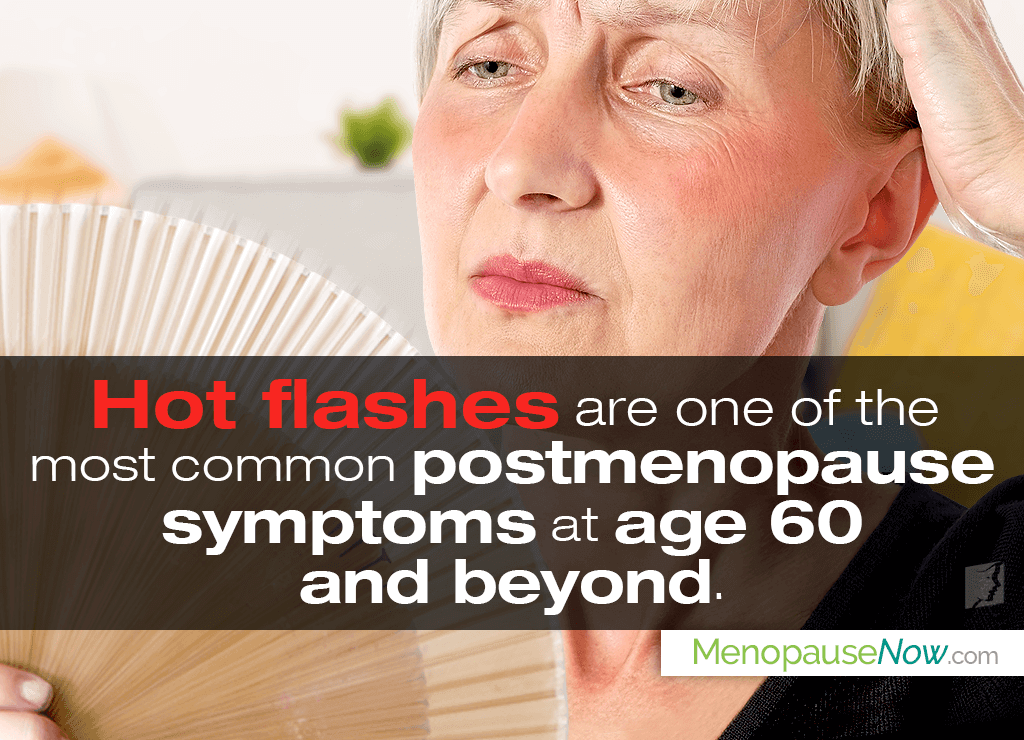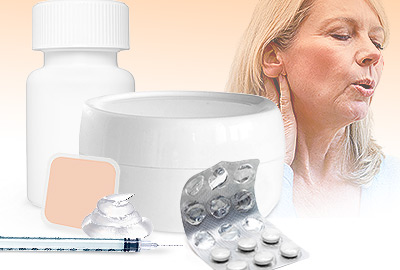While some women may believe hormonal imbalance symptoms stop with menopause, it is not uncommon for women to experience them well into their postmenopausal years, even after the age of 60.
Continue reading to learn all about postmenopause symptoms over the age of 60, including which ones are more common and how to go about treating them for long-lasting relief.
Most Common Symptoms
Leading the most common - and most talked about - postmenopause symptoms at age 60 and beyond is hot flashes.
According to a recent study, hot flashes persisted in around 40 percent of postmenopausal women aged 60 to 65, with 6 percent of them rating them as moderately to severely bothersome.1 That number decreased to 15 percent once a woman hit 66 and dropped even further to 9 percent by the age of 72.2
Women in their 60s also frequently suffer from other postmenopause symptoms, such as:
- Vaginal dryness and itching, affecting up to 50 percent of women after menopause up to age 753
- Urinary incontinence, affecting 35 percent of women over the age of 654
- Weight gain, which affects 75 percent of aging women after 60 no matter their menopausal status5
- Insomnia and other sleeping disorders that prohibit more than 73 percent of postmenopausal women up to age 79 from sleeping eight hours6
While aforementioned symptoms do occur commonly in women after they have ended their reproductive years, keep in mind that each woman's menopausal transition is unique to her.
Complications after Menopause
Low hormone levels in postmenopausal women pose the possibility of more serious health complications arising, including:
Osteoporosis. Twenty-two percent of postmenopausal Caucasian women aged 60 to 69 in the United States are estimated to have osteoporosis. That number increases to 39 percent for women aged 70 to 79 and 70 percent for those at least 80 years old.7
Heart disease. Two groups of women are at an increased risk of coronary heart disease: those aged 60 or older and those who have been taking postmenopausal hormone therapy for up to 20 years since the onset of perimenopause.8
Endometrial cancer. Cancer of the uterine lining, called the endometrium, is most commonly diagnosed in postmenopausal women between the ages of 60 and 70, especially if they've had a late menopause after the age of 55.9
In order the reduce the risk of these health conditions developing as well as allay any symptoms, postmenopausal women should look to treat the underlying cause of hormonal imbalance.
Treating Postmenopause Symptoms Age 60+
Postmenopause treatments for symptom relief first revolve around the enactment of lifestyle adjustments alongside the use of alternative medicine for ideal effects.
Lifestyle adjustments. An improved diet rich in phytoestrogens and the three macronutrients - lean protein, complex carbs, and healthy fats - is key for postmenopausal nutrition. Also, aging women should aim for regular, weight-bearing exercise to encourage optimal muscle mass and weight as well as practicing wholesome habits for endocrine health.
Alternative medicine. Phytoestrogenic herbal supplements - such as black cohosh or red clover - as well as hormone-regulating supplements, like Macafem, are two well-renowned options for promoting hormonal health well into a woman's postmenopausal years.
Postmenopause women should work with their doctors to develop a treatment plan that works best for them. If non-invasive measures do not provide relief, HRT may be recommended.
Conclusions
While some women dread having postmenopause symptoms at age 60 and beyond, they should rest assured that as long as prompt attention is pursued, an improved quality of life and prevention the onset of any more serious health complications, such as osteoporosis, is possible. As such, it is especially important that women bring any alarming or long-lasting symptoms to the attention of their healthcare professional so they can be addressed accordingly.
Sources
- Dalal, P.K. (2015). Postmenopausal syndrome. Indian Journal of Psychiatry, 57(Suppl 2), S222-S232. doi: 10.4103/0019-5545.161483
Footnotes:
- Gartoulla, P. et al. (2015). Moderate to severe vasomotor and sexual symptoms remain problematic for women aged 60 to 65 years. Menopause, 22(7), 694-701. doi: 10.1097/GME.0000000000000383
- Harvard Health Publishing. (2015). Is it normal for hot flashes to last long after menopause begins? Retrieved September 25, 2019, from https://www.health.harvard.edu/womens-health/is-it-normal-for-hot-flashes-to-last-long-after-menopause-begins
- Huang, A.J. (2010). Vaginal symptoms in postmenopausal women: self-reported severity, natural history, and risk factors. Menopause, 17(1), 121-126. doi: 10.1097/gme.0b013e3181acb9ed
- Cleveland Clinic. (n.d.). Female Incontinence. Retrieved September 25, 2019, from https://my.clevelandclinic.org/health/diseases/16998-female-incontinence
- Kapoor, E. (2017). Weight Gain in Women at Midlife: A Concise Review of the Pathophysiology and Strategies for Management. Mayo Clinic Proceedings, 92(10), 1552-1558. doi: 10.1016/j.mayocp.2017.08.004
- Kripke, D.F. (2001). Sleep Complaints of Postmenopausal Women. Clinical Journal of Women's Health, 1(5), 244-252. doi: 10.1053/cjwh.2001.30491
- John Hopkins Arthritis Center. (n.d.). Osteoporosis Information. Retrieved September 25, 2019, from https://www.hopkinsarthritis.org/arthritis-info/osteoporosis-info/
- The North American Menopause Society. (2017). The 2017 hormone therapy position statement of The North American Menopause Society. Menopause, 24(7), 728-753. doi: 10.1097/GME.0000000000000921
- Harvard Health Publishing. (2018). Postmenopausal bleeding: Don't worry — but do call your doctor. Retrieved September 25, 2019, from https://www.health.harvard.edu/womens-health/postmenopausal-bleeding-dont-worry-but-do-call-your-doctor




